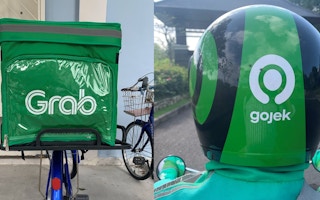Southeast Asia’s largest ride-hailing firms have made pledges to decarbonise, but the two market leaders have seen emissions motor over the past year, according to newly published data.
Singapore-based Grab pledged to achieve carbon neutrality by 2040 a year ago, but the firm’s carbon emissions jumped by 123 per cent between 2021 and 2022, according to the company’s latest environmental, social and governance (ESG) report.
Indonesian competitor GoTo, the owner of ride-hailer Gojek and e-commerce brand Tokopedia, saw its emissions rise by 19 per cent over the same time period, the firm declared in its ESG report published last week. GoTo set a target to achieve “zero emissions” by 2030 in 2021.
Grab’s 2022 total emissions jumped to 3.35 million tonnes of carbon dioxide equivalent (tCO2e), 98 per cent of which comes from the firm’s Scope 3 emissions, or the fleet of more than 5 million vehicles used to ferry passengers and make deliveries.
GoTo, which operates in fewer Southeast Asian markets than Grab, saw total 2022 emissions rise to just shy of 1 million tCO2e (976,953 tCO2e).
Grab blamed the rise on the rebound in demand for its mobility services as Southeast Asia has recovered from the Covid-19 pandemic and the inclusion of a new acquisition, Malaysian supermarket business Jaya Grocer, in the firm’s greenhouse gas inventory.
GoTo also cited post-pandemic demand for its emissions increase as well as a change in methodology for how it calculates Scope 3, or full value chain emissions.
The emissions increases come as both companies make efforts to decarbonise.
In its ESG report, Grab claims to have avoided 39,000 tonnes of greenhouse gas emissions through the use of some zero-emissions transport options such as bicycles and electric vehicles to make deliveries and low-emissions options such as hybrid vehicles for taxi services.
GoTo is developing a “closed-loop” EV ecosystem with Electrum, a joint venture with energy firm TBS Energi Utama, and has seen growth in the number of consumers offsetting their travel emissions through its app.
A Grab spokesperson told Eco-Business that its carbon neutrality strategy largely depends on how quickly it can encourage its drivers to switch to EVs and the market readiness for electrification. Only Singapore and Indonesia have announced plans to electrify their vehicle population, by 2040 and 2050, respectively, the spokesperson noted.
The 11-year-old company said it was pushing for electrification by working with regulators to ensure the transition does not “burden” drivers. Grab’s head of sustainability and marketing said last year that EVs could not match fossil fuel-powered vehicles on price and performance in Southeast Asia.
Grab noted that its 2040 carbon neutral target includes “assumptions of a high growth trajectory”. The super-app is projected to grow gross merchandise value, the total amount of sales via its food-to-financial services platform, by 40 per cent annually as it expands the ecosystem – growth that will come with a carbon cost.
Grab said before it launched its carbon neutrality target it had sought alignment with the Paris Agreement’s 1.5 degree Celsius limit – the safe threshold for global warming, which is approved by the Science Based Targets Initiative (SBTi) – but couldn’t because of the firm’s business growth trajectory and the region’s nascent EV infrastructure.
GoTo’s “zero emissions” climate target is not aligned with the Paris Agreement for similar reasons, although the company is a supporter of the SBTi framework.
A GoTo spokesperson said it was committed to ensuring that business growth does not come at the expense of its sustainability goals, dubbed the “Three Zeros”, which include targets for waste reduction and social inclusion.
Neither company declares the proportion of their climate targets that will rely on offsets – projects they fund that lock in emissions, such as tree-planting schemes or renewables projects – to compensate for their carbon pollution.
Grab’s 2022 emissions would require more than 100 million trees to offset, according to one carbon calculator, GoTo’s about a third of that number.

















